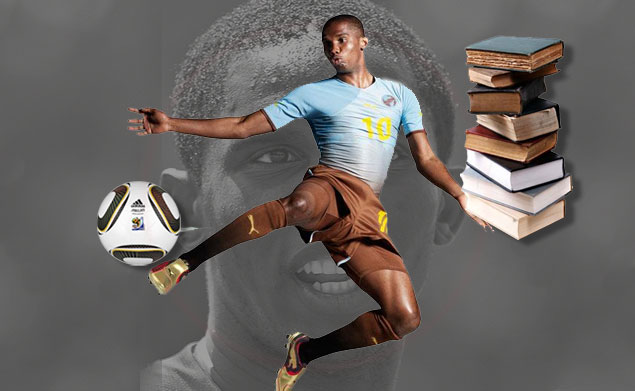Affrontare l'idea sbagliata che il calcio e l'educazione sono entità separate
Figlio: "Papà, Credo di aver deciso cosa voglio essere quando ho finito la scuola secondaria “.
Padre: “In questo mio ragazzo, che cosa è che avete deciso di fare? Essere un medico come la vostra zia, un insegnante come tua madre o di un avvocato come tuo padre?"
Figlio: "No papà, I want to be a professional football player. I want to play for NY Redbulls. The coach had a look at me the other day and said I have real talent”
Padre: “You know what my son, follow your heart; I think you can definitely make that work.”
PAUSE
If your head is currently spinning and you find this conversation fake, chances are you were born and raised somewhere on the African continent. In all likelihood, the actual conversation went something like this;
Figlio: "Papà, Credo di aver deciso cosa voglio essere quando ho finito la scuola secondaria “.
Padre: “In questo mio ragazzo, che cosa è che avete deciso di fare? Essere un medico come la vostra zia, un insegnante come tua madre o di un avvocato come tuo padre?"
Figlio: "No papà, I want to be a professional football player. I want to play for Warri Wolves. The coach had a look at me the other day and said I have real talent”
Padre: “Hahahaha, you want to do what ?! After all the money I have paid for school fees you have now decided to be a professional football player instead? Don’t be stupid. Go study your books and stop filling your head with those day dreams.
Ora, before you get off on the wrong foot and start believing that the African father is some sort of soul crusher consider the reality that the majority of African soccer stars never went to school. And if they did, you would be able to count on two fingers the number who actually made it all the way to university. What never gets asked however is what happens to those players when they get done with their playing days? Or more realistically, what happens to them when soccer is done with them?
The short answer is nothing. If they were lucky to leave and play abroad they may have scraped some money together and can eke out a living as a business man. For the majority though, once the spotlight has faded and no one stops them in the street anymore to recount that wonder goal that they scored the other day, it is off to the pile of forgotten things; Somewhere between the fourth stanza of your national anthem and the 13 times table.
A cursory look over the national teams of most African countries will read like a road map through the different poor areas of that country. Places where football was the only way out rather than being an option. Given the choice between football and an education, most would pick the education route. Unfortunately that is not a choice that many have.
We are addicted to soccer, to the point where other than the various religious establishments; little else commands such a loyal following.
Now ordinarily this would not be something to complain about but our fascination with soccer is reserved for the English premier league or the Spanish La Liga. So much so that the local league attendance drops dramatically when local games coincide with foreign fixtures. This decline of public interest in the local game coupled with the perception that professional soccer in Africa is a dead end road, has led to a dearth of educated professional players.
Unlike in the United States, where you have to go to College for at least 1 o 2 years before you turn professional, here kids are picked straight out of high school and more often than not never return to finish their education.
This has led to the perception that professional soccer is no place whatsoever for anyone with aspirations of getting a good education, something that a lot of our parents drum into us when we are making the transition from high school to college. This has led to a lot of erstwhile talented players abandoning football at the behest of their parents to focus on their studies.
So what then for those in the middle? Able to go to a good school and get a chance at a university education; yet talented enough to make an impact on the professional scene?
The answer is not a short one. But there are projects underway to try and find some sort of middle ground and demonstrate that it is possible to marry the two.
One example is Hope Football Club. Established in 2009 by a group of students eager to address the misconception that soccer and education are not compatible, Hope FC currently competes in the third tier of the Ugandan football pyramid.
Each of the players in the team and the executives on the board holds a minimum high school education and the club as a whole was built on a simple principle. That all a student and/or athlete needs is a place where the challenges of going to school and being a professional athlete are understood. Ancora più importante, a place where the duality is accepted as a challenge rather than an incompatible pairing.
So perhaps the next time a father and son have that conversation, the script will read more like the former. Rather than the latter.
Hope Football Club Project: http://followhopefc.wordpress.com
Ultimi post di Zack (vedi tutti)
- Descrivere l'Africa a un bambino? - Settembre 24, 2014
- Papà che cosa ci vuole per essere una donna africana? - Settembre 4, 2014
- acirfA rethoM - Dicembre 4, 2013




